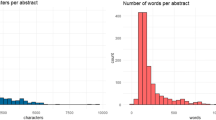Abstract
This symposium explores the ways in which women are descriptively represented in political science, by exploring the ways in which they are positioned institutionally in Spain, Finland, Germany and the United Kingdom. The symposium also explores the ways in which structures may serve to disadvantage women, by analysing HE policy and citation practices. Critical theory reminds us that in observing power structures we can seek to change them, and so our conclusion reflects on some more practical suggestions.
Similar content being viewed by others
References
Amey, M.J. and Eddy, P.L. (2002) ‘Leadership’, in A.M. Martinez Aleman and K.A. Renn (eds.) Women in Higher Education, Santa Barbara, CA: ABC: CLIO, pp. 482–486.
Amey, M.J. and Twombly, S.B. (1992) ‘Revisioning leadership in community colleges’, Review of Higher Education 15 (2): 125–150.
Bates, S., Jenkins, L. and Pflaeger, Z. (2012) ‘Women in the Profession: The composition of UK Political Science Departments by Sex’, Politics 32 (3): 139–152.
Editorial. (2013) ‘Science for all’, Nature 7th March (495): 5.
Enloe, C. (2013) Seriously! Investigating Crashes and Crises as If Women Mattered, Berkeley: University of California Press.
Goldin, C. and Rouse, C. (2000) ‘Orchestrating impartiality: The impact of ‘blind’ auditions on female musicians’, The American Economic Review 90 (4): 715–741.
Hall, R. and Sandler, B. (1982) The Classroom Climate a Chilly One for Women, Washington, DC Project on the status and education of women Association of American Colleges.
Hesli, V., Lee, J.M. and Mitchell, S.M. (2012) ‘Predicting rank attainment in political science: What else besides publication affects promotion?’ PS: Political Science and Politics 45 (3): 475–492.
Karpowitz, C., Mendelberg, T. and Shaker, L. (2012) ‘Gender inequality in deliberative participation’, American Political Science Review 106 (3): 533–547.
Knights, D. and Richards, W. (2003) ‘Sex discrimination in UK academia’, Gender, Work & Organisation 10 (2): 213–238.
Millett, K. (1977) Sexual Politics, London: Virago.
Moss-Racusin, C., Dovidiob, J.F., Brescollc, V.L., Grahama, M.J. and Handelsman, J. (2012) ‘Science faculty’s subtle gender biases favor male students’, Proceedings of the National Academy of Sciences of the United States of America 109 (41): 16474–16479.
Rich, A. (1979/1986) On Lies, Secrets and Silence, London: Virago.
Savigny, H. (2014) ‘Women, Know your limits: cultural sexism in academia’, Gender and Education 26 (7): 794–809.
Author information
Authors and Affiliations
Rights and permissions
About this article
Cite this article
bates, s., savigny, h. introduction: women in european political science. Eur Polit Sci 14, 75–78 (2015). https://doi.org/10.1057/eps.2015.3
Published:
Issue Date:
DOI: https://doi.org/10.1057/eps.2015.3




